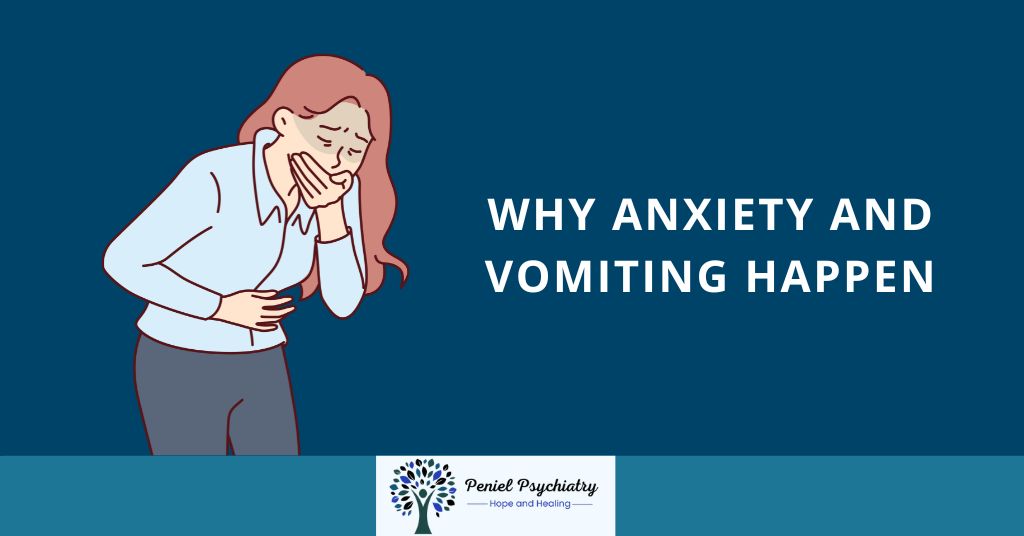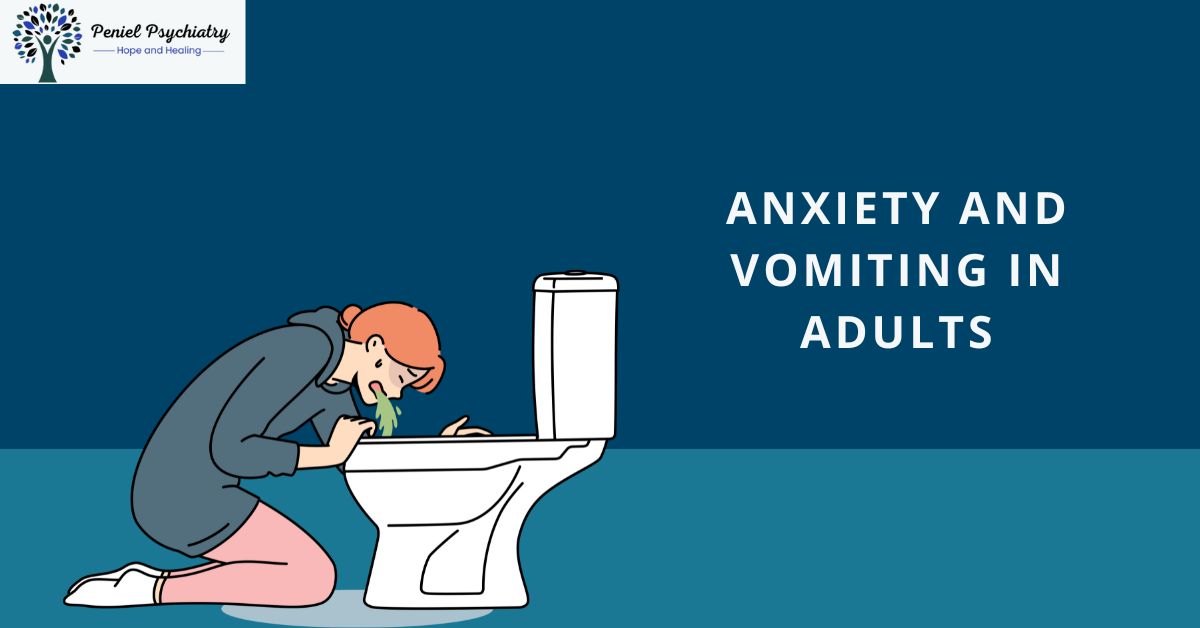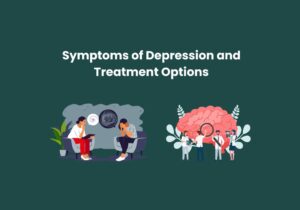Feeling sick to your stomach before a big event isn’t just nerves; it could be anxiety and vomiting in adults. It’s more common than you think. When anxiety hits, it doesn’t just affect your mind. It can mess with your gut, too. Many people deal with nausea, stomach cramps, or even throwing up when stress gets too high. In this post, we’ll break down how anxiety affects your body, why it can lead to vomiting, and what you can do to feel better.
Can Anxiety Make You Vomit?
Anxiety can do a lot more than make you feel worried or tense. It can cause vomiting. This happens because of the strong link between your brain and your stomach. When you feel anxious, your body goes into “fight or flight” mode.
This means your body prepares to deal with danger, even if there isn’t any real threat. One result is that your digestion slows down or even stops. Your gut gets upset, and nausea or vomiting can follow.
How the Gut-Brain Connection Works
Your brain and gut are connected through nerves that send signals back and forth, allowing for a complex interplay between the two. When anxiety kicks in, the brain sends stress signals that can upset your stomach. This is why anxiety often causes stomach pain or nausea.
The Fight or Flight Response
When your body senses danger, it releases chemicals like adrenaline. These chemicals make your body ready to run or fight. At the same time, digestion slows because your body prioritizes survival over digestion. This can cause your stomach to feel sick or even lead to vomiting.
Why Anxiety and Vomiting Happen: The Science Behind It
Anxiety causes changes in your body that explain why vomiting can happen. When you feel stressed, your body releases hormones like cortisol and adrenaline. These stress hormones affect many parts of your body, including your stomach.

Role of Stress Hormones
Cortisol and adrenaline prepare your body to handle stress, but they also slow down the digestive process. This can cause nausea from anxiety or make your stomach feel upset.
The Vagus Nerve Connection
A key player in this process is the vagus nerve. It links your brain and gut. When anxiety hits, the vagus nerve sends signals that can upset your stomach, causing cramps or vomiting. This is why physical symptoms of anxiety often include digestive issues.
Is It Common to Vomit from Anxiety?
Vomiting caused by anxiety is more common than many people think. While not everyone who feels anxious will vomit, those with substantial or long-lasting anxiety may experience it more often.
Who Does It Affect Most?
People with chronic anxiety or panic attacks are more likely to have symptoms like nausea and vomiting. It can happen at any age, but it often affects adults dealing with ongoing stress.
A Real-Life Feeling
Many people say that vomiting from anxiety feels like their body’s way of reacting to stress when it gets too much. It’s a real physical response, not just in the mind.
Other Digestive Symptoms Linked to Anxiety
Anxiety doesn’t just cause vomiting. It can also cause other digestive problems. These symptoms happen because anxiety affects your gut and how it works.
Nausea
Feeling nauseous or sick to your stomach is common when you’re anxious. It can come and go or last for a while.
Stomach Cramps
Anxiety can cause your stomach muscles to tighten, leading to cramps or pain that can be sharp or dull.
Diarrhea or Constipation
Some people may experience loose stools, while others struggle to have a bowel movement. Anxiety can disturb the normal rhythm of your digestion.
Loss of Appetite or Emotional Eating
Anxiety might make you lose interest in food or, on the other hand, make you eat more than usual to feel better.
How to Tell It’s Anxiety, Not Something Else
Sometimes, vomiting and stomach issues can mean other health problems, not just anxiety. It’s essential to know when to consult a doctor.
When to See a Doctor
If vomiting lasts a long time, accompanies fever, severe pain, or weight loss, it’s time to seek medical advice. These signs could mean something else.
Red Flags That Signal a Different Condition
Look out for blood in vomit, chest pain, or trouble breathing. These need urgent care and are not just anxiety symptoms.
Quick Checklist for Self-Assessment
- Is vomiting tied to stressful moments?
- Do symptoms improve when calm?
- Any other health problems or new medicines?
- If you are unsure, consult a healthcare provider for guidance.
Knowing the difference helps you get the right help quickly.
Professional Treatments & Therapies
When anxiety causes vomiting, some treatments can help you feel better. Getting the proper support is key.
Cognitive Behavioral Therapy (CBT) for Anxiety Management
CBT is a type of talking therapy. It helps you change thoughts and habits that cause anxiety. Many people find that CBT reduces their physical symptoms, like nausea and vomiting.
Medications That Help Both Anxiety and Vomiting
Some medicines, like certain antidepressants (SSRIs) or anti-nausea drugs, can ease both anxiety and vomiting. A doctor can guide you on what works best.
When to Consult a Specialist
If symptoms are intense or persist for an extended period, consult a mental health professional or a gastroenterologist. They can provide more focused care. Getting professional help can make a big difference in managing anxiety and its effects on your stomach.
Need advice on managing anxiety or gut issues? Book a session with us today. We’re here to help you feel better, one step at a time.
Long-Term Prevention Tips
Creating healthy habits can help reduce anxiety and stop nausea or vomiting from coming back. These small changes are simple but powerful.
Build a Daily Stress-Relief Routine
Stress piles up if we don’t manage it. Make time every day to move your body, go for a walk, stretch, or try light exercise. Even five minutes helps. Mindfulness and breathing exercises can also calm your mind fast. Apps, YouTube videos, or quiet time alone can be enough. The goal is to teach your body that it’s safe.
Get Better Sleep to Protect Your Gut
Poor sleep can upset your stomach and trigger more anxiety. Try to stick to the same sleep and wake times each day. Avoid screens before bed and keep your room calm and quiet. Your gut and brain communicate with each other, and rest helps maintain that connection.
Use a Journal to Spot Anxiety Triggers
Anxiety often follows a pattern. Writing down your thoughts, symptoms, meals, and daily stress levels can help you identify what triggers or exacerbates your issues. With time, you’ll begin to spot triggers. This enables you to avoid them or plan how to handle them better. Many people find that just tracking their emotions brings relief.
Tips from People Who’ve Been Through It
Hearing from others who have faced anxiety and vomiting can be comforting and helpful. Their real-life tips can give you practical ideas to try.
Short Bullet Quotes or Anonymous Tips
- “Breathing slowly helped me stop the nausea during panic attacks.”
- “Keeping a water bottle nearby made me feel more in control.”
- “Talking to a friend when I felt anxious reduced my stomach upset.”
- “Distracting myself with music or a walk calmed my mind and body.”
These simple actions may seem small, but they can make a big difference when anxiety hits.
Adds Relatability and a Human Touch
Knowing others share your experience reminds you that you’re not alone. These tips show how people manage their symptoms in daily life.
Perfect Section to Repurpose Into Reels or Carousels
You can turn these tips into quick social media posts or short videos to reach others who need support and easy ideas.
Final Thoughts
Dealing with anxiety and vomiting in adults can feel tough, but you’re not alone in this. Many people face these symptoms and find ways to manage them. Remember, help is available, and reaching out to a mental health professional can make a real difference.
Taking care of your mind and body is key to feeling better. If you or someone you know struggles with anxiety-related vomiting, don’t hesitate to seek support. Small steps can lead to significant improvements in your well-being.
Consult a mental health professional or visit a support resource to begin your journey to improved well-being.
FAQs About Anxiety and Vomiting in Adults
Can anxiety cause vomiting every day?
Anxiety can cause vomiting, but daily vomiting is rare. If it occurs frequently, it’s essential to consult a doctor to rule out other potential causes.
How do I calm my stomach when I’m anxious?
Try deep breathing, drinking water slowly, or sipping ginger tea to help alleviate symptoms. These can help soothe nausea linked to anxiety.
Is vomiting a symptom of a panic attack?
Yes, vomiting can happen during a panic attack due to intense fear and the body’s stress response.
When should I see a doctor for vomiting caused by anxiety?
See a doctor if vomiting is severe, lasts a long time, or is accompanied by other severe symptoms, such as dehydration or weight loss.
Can therapy help reduce anxiety-related vomiting?
Yes, therapy like Cognitive Behavioral Therapy (CBT) can help manage anxiety and reduce physical symptoms like vomiting.




